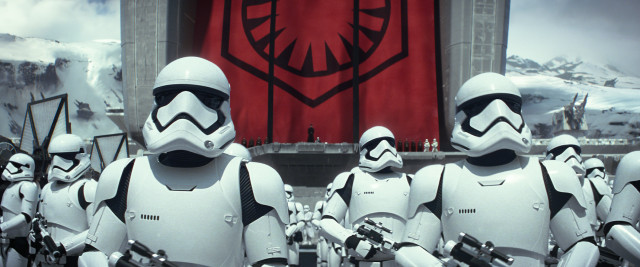warning: some mild Star Wars: The Force Awakens spoilers follow.
Even before its release, Star Wars: The Force Awakens was the subject of both critical praise (and racist hate) for its multicultural cast. But while the seventh chapter of Star Wars has been lauded for appearing more inclusive, the film ultimately suffers from some of the deeply conservative, even subtly racist tropes inherent to most big budget action movies—the same kinds of flimsy hero logic that provide the moral justification for racist “Stand your Ground” laws across many US states.
To understand this connection, let’s start with a recent article about Star Wars written by Aaron Bady in The New Inquiry. Bady writes:
[Finn the Stormtrooper’s] psychology makes no sense at all if you think even a little bit […] there’s something extremely unsettling about how easily he shrugs off a lifetime of indoctrination into a fascist death-cult, how quickly and painlessly he becomes one of the guys, just basically a good dude. […] Where is the ideological indoctrination (and psychological scar tissue) that would have accompanied being crassly made into biopower and canon-fodder?
Bady doesn’t quite go so far as to touch on the allegory of Finn-as-slave, though it seems like the filmmakers are rubbing it in our face. Finn (John Boyega) is a “rebel” stormtrooper who describes having been stolen from his family as a child to serve in the despotic First Order—a series of events that, in our own galaxy, we’d be apt to call “slavery.” The Star Wars movies have touched on slavery before—recall Darth Vader (formerly Anakin Skywalker) was a child slave, although as a white character serving an alien master, his character lacked the symbolic thrust held by a black character like Finn. (“Do race and racism exist in the Star Wars universe as they do in ours?” is a wholly different question, and one that is never really examined with any satisfaction). Continue reading

